
FEATURES
President Bola Tinubu says the Economic Community of West African States (ECOWAS) must undergo bold and comprehensive reforms to address future challenges.
Tinubu, who is also the ECOWAS chairman, spoke on Tuesday as officials convened in Accra, Ghana to deliberate the implications of the exit of Mali, Niger, and Burkina Faso.
Tinubu urged the bloc to rededicate itself to the spirit of pan-Africanism that inspired its founders.
“I reaffirm Nigeria’s unwavering commitment to the fundamental principles that bind us: democracy, the rule of law, good governance, and regional solidarity,” he said.
“These are not just ideals; they are the foundations for peace, development, and the dignity of our people.”
He urged ECOWAS to remain open and willing to engage in sustained, constructive dialogue with Mali, Niger, and Burkina Faso in hopes of reconciliation and reintegration.
“At the same time, there is an urgent need to implement bold, comprehensive reforms that will enhance our institutions’ effectiveness, relevance, and credibility to meet the challenges of today and the future,” he added.
“By embracing these imperatives, the organisation can better respond to its people’s evolving needs and advance sustainable development, stability, and prosperity across the region.”
The president said youths across the region must be placed at the centre of the bloc’s agenda, and asked member states to prioritise investments in education.
He also called for the acceleration of the realisation of a single currency and strengthened infrastructure corridors to connect markets and minds.
[TheCable]
President Bola Ahmed Tinubu has entered a closed-door meeting with top security officials amid escalating violence in parts of the country.
The meeting, currently underway at the President’s official residence in the Aso Rock Presidential Villa, began shortly after 3:00 p.m. on Wednesday. It comes in the wake of growing insecurity, particularly in Plateau, Benue, and Borno States.
A heavy flow of vehicles carrying service chiefs, including heads of the Army, Navy, Air Force, and the Inspector-General of Police, into the Villa have been observed earlier in the afternoon.
The meeting follows Tinubu’s return to Abuja late Monday after an 18-day working visit and policy retreat in Paris and London. According to sources, the President had been closely monitoring developments back home and had been issuing directives to security agencies while abroad.
Human rights activist and lawyer, Deji Adeyanju has said that President Bola Tinubu would not lose an election he conducts.
Reacting to the defection of key members of the People Democratic Party (PDP) including the governor of Delta State, Sheriff Oborevwori, the lawyer said it is too late for Peter Obi and Atiku Abubakar to win the 2027 election.
According to Adeyanju, it will still be impossible to oust Tinubu in 2027 with Obi and Atiku on a joint ticket.
In a post in X, Adeyanju said, “Even if Atiku & Obi are on a joint ticket now, it’s too late.
“Tinubu will not lose an election Tinubu conduct,” he wrote.
He also stated that the luckiest opportunity the duo ever had against Tinubu was in 2023.
His words, “They had their luckiest chance in 2023 but they kept playing to the gallery and entertaining their supporters. And Buhari was ready to work with them.”
Recall that Atiku have been championing a coalition plan with key political leaders across the country.
Some of these leaders include a foemer governor of Kaduna State, Nasir El-Rufai who recently dumped the All Progressives Congress (APC) for the Social Democratic Party (SDP).
Benue State Governor, Hyacinth Alia, has appointed Nigerian music legend Innocent Idibia, popularly known as TuFace, as his Technical Adviser on Entertainment and Community Outreach.
In a viral video on Wednesday, Alia praised TuFace for all the support towards his administration.
The governor stated that TuFace can do more.
He stated, “On behalf of the Benue State government and our very good people, we want to give you some more responsibility plus the ones you have been doing because you have the capacity to do some more and help us chart a way forward to improve other people’s lives and to gain more from your wisdom and advise as well.
“So, I’m pleased to announce that we will make you a technical adviser to the governor on entertainment and community outreach.”
'We cannot continue to be in sinking boat' - Delta State Governor Sheriff Oborevwori, Okowa, others dump PDP Defect to APC
AFOLABIDelta State Governor, Sheriff Oborevwori, the immediate past governor, Ifeanyi Okowa, and all members of the Peoples Democratic Party in Delta State have defected to the All Progressives Congress.
The announcement was made on Wednesday in Asaba, the Delta State capital, by Senator James Manager, shortly after a meeting that lasted over six hours at Government House, Asaba.
Manager stated, “All PDP members in the state, including the governor, former Governor Okowa, the Speaker, the state party chairman, all the local government chairmen and others, have agreed to move to the APC.
“We cannot continue to be in a sinking boat,” he said.
The Delta State Commissioner for Information, Mr Aniagwu Charles, officially confirmed the governor’s defection and the collective decision of Delta PDP leaders and stakeholders to join the APC.
“There is a need for us to adjust our drinking patterns. And in adjusting that drinking pattern, we needed to make a decision that would further help to cement the development in our state, to build the court of law that has existed in our state, to further advance the cause of security and the welfare of our people, and, to a large extent, ensure that development in Delta is not truncated,” Aniagwu stated.
He continued, “In taking that decision, we concluded that leaving the PDP was very necessary for us to be able to collaborate and build a state that every Deltan will be proud of. We believe that what is happening, and the state of the PDP, is akin to that palm wine whose taste has changed — and there was a need for us to change the drinking party.”
Charles added that the decision was unanimously made by party leaders and stakeholders, hinting at a formal public declaration soon.
“By the grace of God, on Monday next week, we will be able to make a very big statement confirming that we are moving into the APC,” he said.
The move marks a significant turning point in Delta State politics, signalling a broader political recalibration that could reshape party dominance in the South-South region.
The commissioner for information in Akwa Ibom State, Aniekan Umanah has explained the rationale behind Governor Uno Eno’s support for President Bola Tinubu.
Umanah said reports of possible defection of the governor from the Peoples Democratic Party (PDP) to the All Progressives Congress (APC) is not feasible.
According to Umanah, Governor Eno’s endorsement of the President and Senator Godswill Akpabio is a strategic act of enlightened interest for the state.
He added that such moves by the governor are aimed at unlocking the federal collaborations and all benefits due to the people of Akwa Ibom state.
“This growing synergy has already begun yielding visible benefits and will further facilitate key initiatives like the Ibom Deep Seaport, and Ecological Remediation, amongst others.”
“These leaders have shown clear goodwill toward our State and have publicly acknowledged the Governor’s exceptional performance. This is leadership with foresight,” Umanah said.
The 2023 presidential candidate for the Labour Party, Peter Obi on Wednesday announced that he visited Rome to pay his final respect to the late Catholic Pontiff, Pope Francis.
In a post made on X, Obi said he joined Francis Cardinal Arinze and other global dignitaries and mourners at St. Peter’s Basilica.
Obi in the post titled, “Legacy of Light: What Pope Francis Taught the World” said the lying-in-state ceremony of the Pope was a moment of deep reflection.
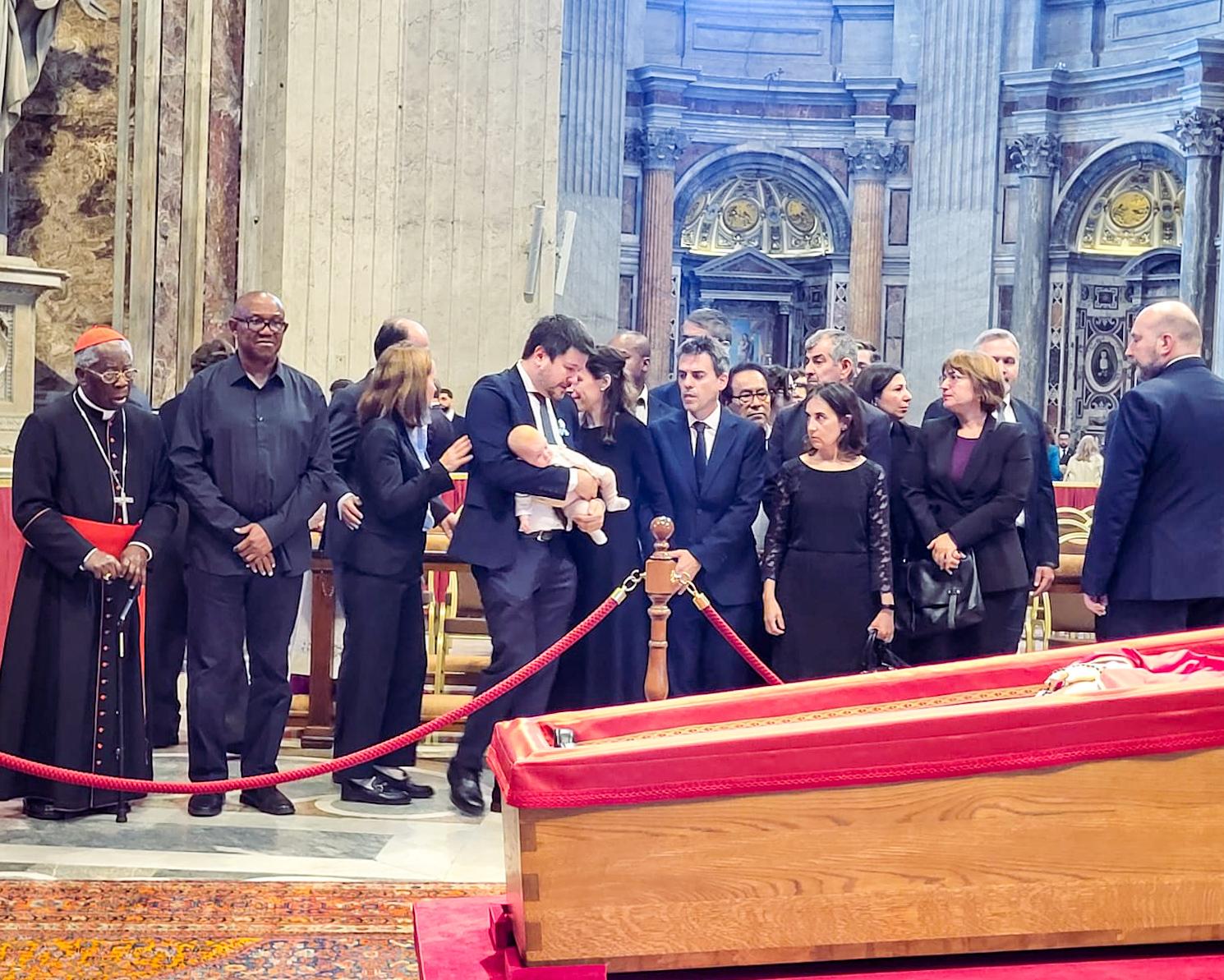
He wrote, “Pope Francis was more than a Pontiff; he was a moral light in a world darkened by inequality and indifference. His life was a testament to leadership as a sacred duty, one rooted in compassion, truth, and service to the poor and marginalised. He lived for others, spoke for the voiceless, and reminded us all that leadership must be about lifting others, not self-exaltation.
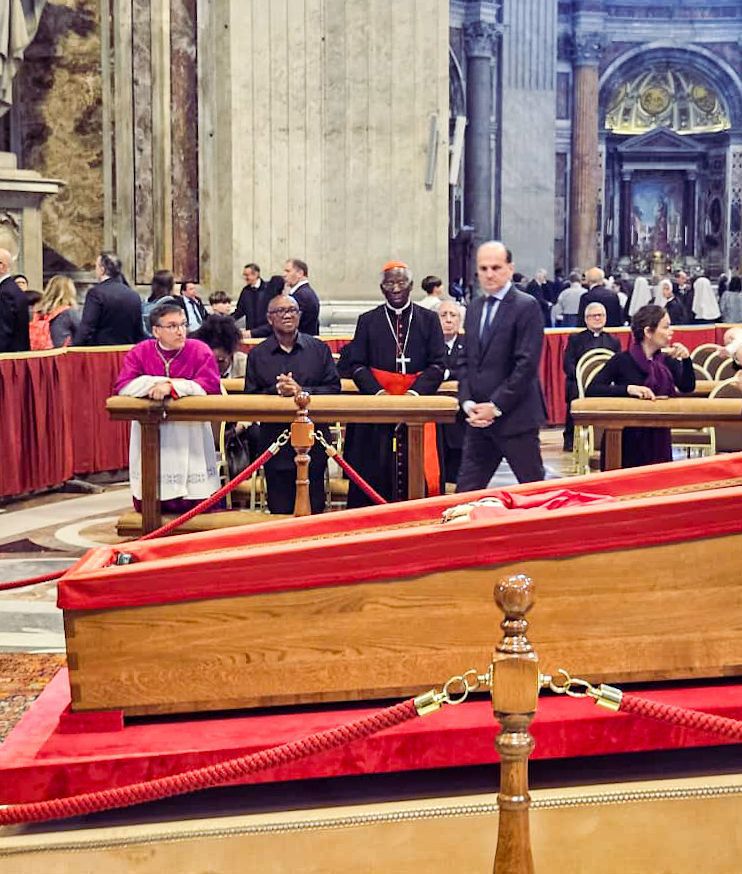
“I came to truly appreciate what he stood for after my appointment as a member of Scholars Occultantes – an international circle of thinkers he founded during his time as Archbishop,” he said.
He added that the organisation has been dedicated to truth, ethical leadership and social justice.
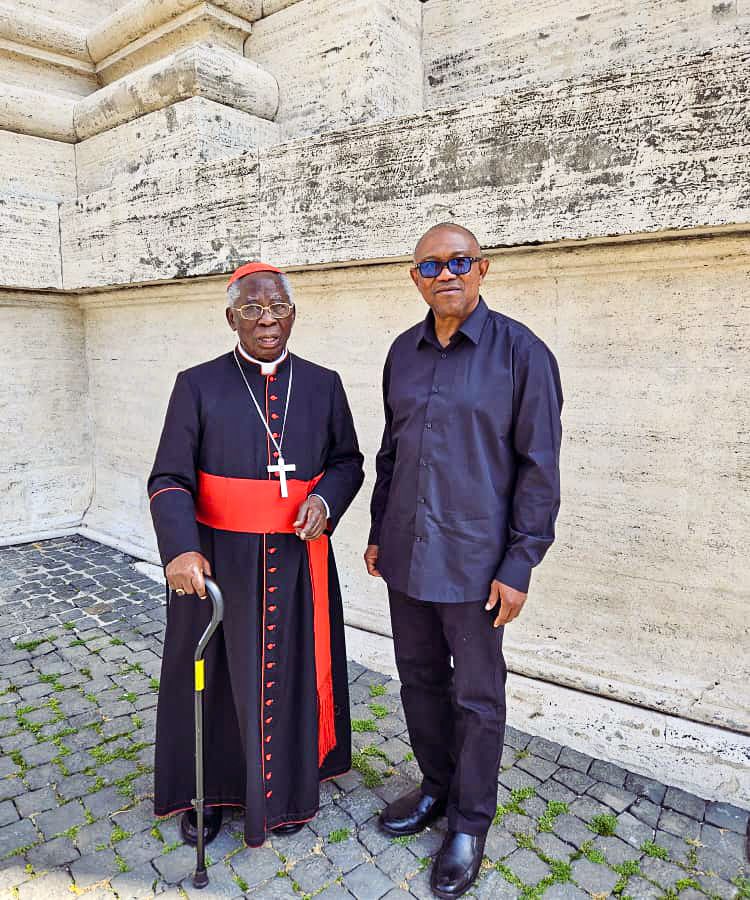
According to Obi, his meeting with the late Pope before his passing was a blessing to him and had lasting impressions on him.
“He radiated peace and inspired faith, and his presence was a quiet yet powerful reminder of the divine responsibility that leadership entails. His humility was infectious, his vision deeply human.
“As we mourn this great soul, I urge political, religious, and community leaders, especially across Africa, to reflect on his life and commit to the values he upheld: justice, peace, and human dignity. Let this moment not just be one of mourning, but a call to lead with conscience, walk with the people and govern with love,” Obi wrote.
Elizabeth Awhobiwom Ukah, a 23-year-old nursing student has been swept away by flood in Calabar, the Cross River State capital city.
It was gathered that the deceased was an indigene of Ohong community in Obudu local government area of northern Cross River State.
Ukah, a student of the Federal Nursing Science college Calabar was said to have been found in a drainage five days after the flood carried away on Good Friday.
Residents of the area said the state and position that her body was discovered showed that she was carried away by flood.
According to the residents, there was a heavy rainfall in the evening of Friday, April 18, at the time the nursing student was returning home from Good Friday mass at Cross at Holy Family Catholic Church Big-Qua Town.
The church which is located by the Eastern Secondary School is close to the popular Marian Market, Calabar, the Cross River State capital.
Ukah’s body which which found on Tuesday has since been deposited in an undisclosed morgue in the city
The National Security Adviser, NSA, Nuhu Ribadu, has suggested that President Bola Tinubu and his administration inherited an extremely bad government, particularly insecurity.
Ribadu stated this on Tuesday when he visited Benue State to commiserate with the government and the people over the killing of over 72 people by terrorists masquerading as herdsmen.
The NSA, who condemned the killings, urged the people of Benue to give Tinubu government a chance and stop politicizing the killings.
According to him, this will help the federal government to restore peace in the state.
“Our Armed Forces are doing well. It is impossible to post soldiers or police to every hamlet. Give us a chance and stop politicizing the killings. This will help us to restore peace. Issue of security is relative,” Ribadu said.
“We inherited an extremely bad government and things have improved and we will address all these issues cropping up.
“It is a matter of time, to do the harm is easy but to solve it is difficult. We have reduced considerably the number of violence we met. This one too, we will confront it,” he added.
In his response, Benue State Governor, Rev. Fr. Hyacinth Alia said it was a sober moment for the state as it has come under intense siege with loss of lives of unimaginable figure since 2011.
DAILY POST reports that there has been a surge in attacks and killings in Benue and Plateau States in the last two weeks.
Just barely a week after suspected armed herders massacred over 50 farmers in parts of Benue State, fresh violence erupted in the early hours of Tuesday.
Gunmen stormed Afia community in Ukum Local Government Area, killing eleven residents and leaving several others injured
President Bola Tinubu has voiced concern over the wave of unconstitutional changes in West Africa, warning that they endanger the region’s democratic progress and overall stability.
According to the president, these changes threaten the democratic gains the region has “painstakingly built”. He spoke on Tuesday while speaking at the official launch of the ECOWAS Golden Jubilee in Accra, Ghana.
The president, who was represented by the Minister of State for Foreign Affairs, Bianca Ojukwu, reaffirmed the country’s unwavering commitment to democratic principles.
“The fundamental principles that bind us: democracy, the rule of law, good governance, and regional solidarity. These are not just ideals; they are the foundations for peace, development, and the dignity of our people,” he said, referring to the resurgence of military rule in the region since 2021.
Between August 2020 and August 2024, West and Central Africa experienced about nine coup attempts, four of which led to the military successfully taking over power in four West African Countries. The countries are; Mali, Guinea, Burkina Faso and Niger Republic.
ECOWAS had condemned each coup, suspended offending members from the bloc’s institutions, and enforced targeted sanctions to pressure juntas back toward civilian rule.
This, however, created tension and eventually led to the official exit of Mali, Niger and Burkina Faso. The three countries, after announcing their exit, formed an economic pact known as the Alliance of Sahel States (AES).
The junta in all three nations had accused ECOWAS of failing to support them in their fight against terrorism and of imposing sanctions that they claim harmed their populations. They also rejected ECOWAS’ request to reconsider their decision to leave the bloc.
Room for Reconciliation
However, speaking at the jubilee event, which marked five decades since ECOWAS was founded in 1975, the Nigerian leader called for renewed commitment to fostering unity and solidarity among member states.
“It is a time to strengthen the bonds that tie us together through shared values, collective responsibility, and a common vision for a prosperous region.”
He described the jubilee celebrations as a new chapter for the bloc while noting that member states must be willing to reconcile with the junta-led countries that pulled out.
“In hopes of reconciliation and reintegration, we must remain open and willing to engage in sustained, constructive dialogue with our estranged brothers, those Member States currently outside our fold.
“At the same time, there is an urgent need to implement bold, comprehensive reforms that will enhance our institutions’ effectiveness, relevance, and credibility to meet the challenges of today and the future,” he said.
More...
The body of late Pope Francis is lying in state in St. Peter’s Basilica, which will remain open for three days until his funeral on Saturday.
World leaders, including President Donald Trump, are expected to attend.
His body was transferred to the Basilica during a procession earlier Wednesday. It was followed by a service led by Camerlengo Kevin Joseph Farrell, the cardinal tasked with arranging Pope Francis’ funeral and the conclave in the weeks ahead.
Francis’ coffin was laid at the Altar of the Confessio, a sacred space in front of the main altar above the tomb of St. Peter, the first pope of the Roman Catholic Church.
Cardinals in the Basilica approached the coffin in pairs to pay their respects. Afterwards, the first members of the public entered to visit the coffin and pay their respects.
The Basilica opened to the public at 11am local time (5am ET) Wednesday and will remain open until midnight.
It will open at 7am and close at midnight on Thursday and Friday.
Thousands of mourners were waiting outside the Basilica in St. Peter’s Square, in clear skies and spring sunshine, for their turn to view the body of the late Pontiff.
Before the procession, Camerlengo Farrell held a brief service in the chapel of Casa Santa Marta with a short antiphon, or chant, of hope.
“Let us thank the Lord for countless gifts that he bestowed on the Christian people through His servant Pope Francis,” the Camerlengo said in prayer.
“Let us ask him in his mercy and kindness to grant the late pope an eternal home in the kingdom of heaven and to comfort with celestial hope, the papal family, the church in Rome and the faithful throughout the world.”
After lying-in-state for three days, Francis’ funeral will begin at 10am local time (4am ET) on Saturday, six days after his death.
The last papal funeral, for Pope Benedict XVI in 2023, was also held six days after his death.
The Vatican announced that Francis’ funeral would be held outside St. Peter’s Square.
A string of world leaders, including US President Donald Trump, have confirmed they will travel to the Vatican for the service. French President Emmanuel Macron, British Prime Minister Keir Starmer, outgoing German Chancellor Olaf Scholz and Ukrainian President Volodymyr Zelensky are among the major European leaders travelling to the Vatican for the funeral.
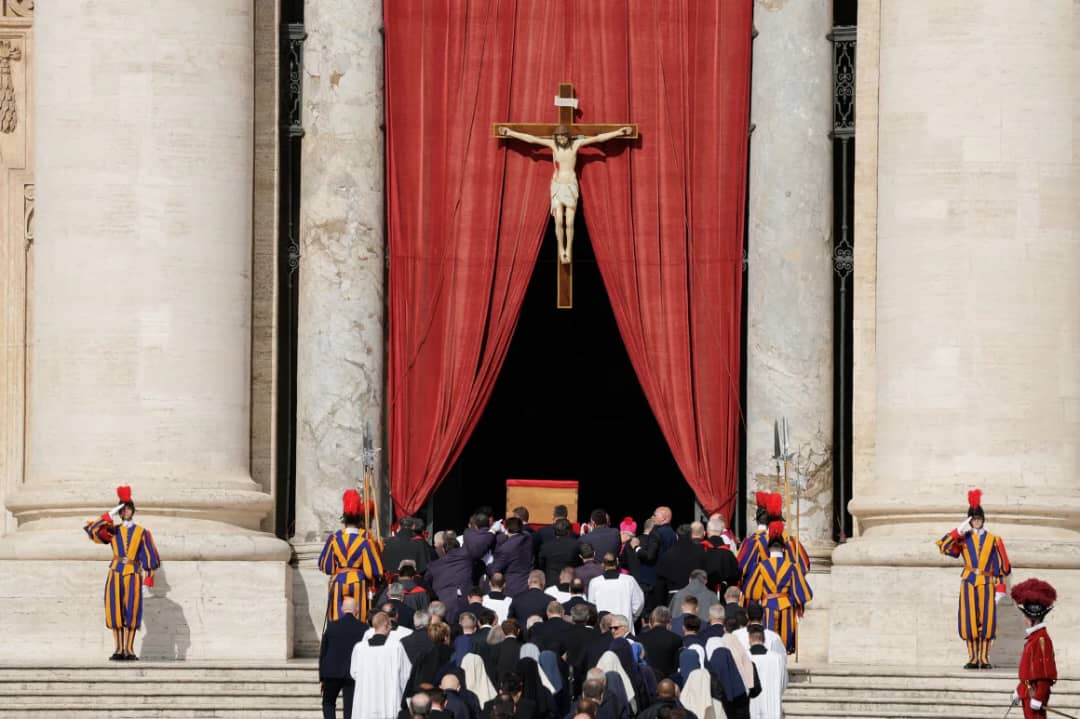
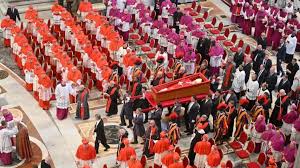
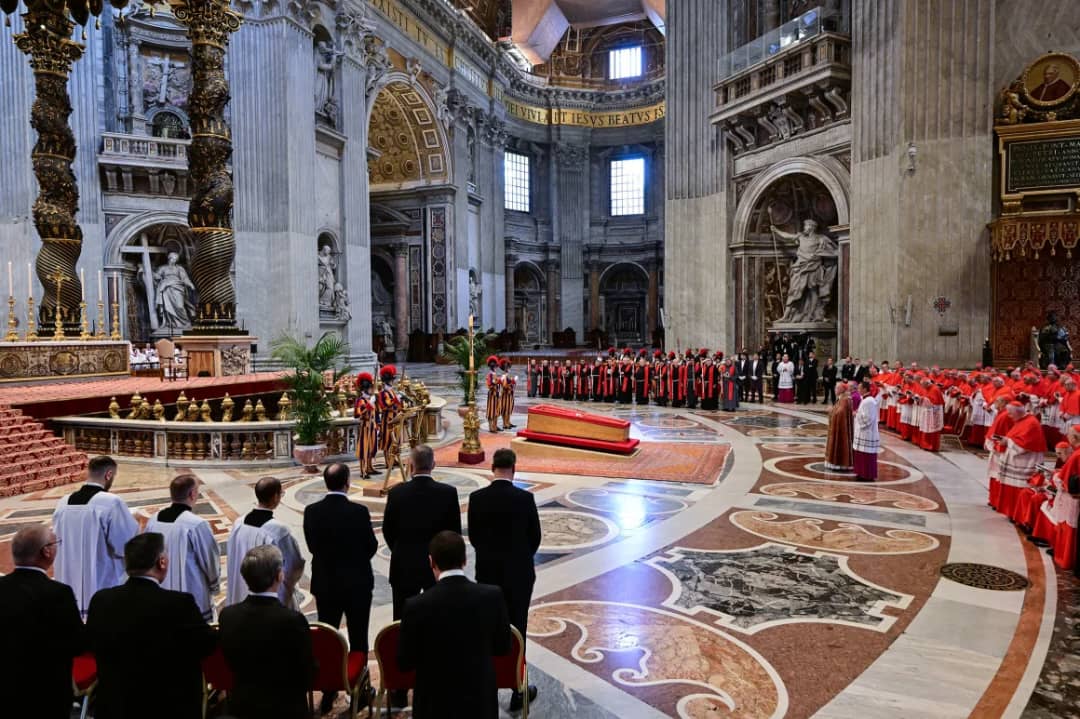
A deserter from the Niger Republic Armed Forces who reportedly joined the Boko Haram terrorist group has surrendered to local authorities in Kindjandi, located in the Diffa Region of southeastern part of the country.
The former soldier who is identified as Abba Ibrahim, had been serving with the Nigerien Armed Forces since 2022 before deserting his post in Bosso on March 8, 2025, according to military intelligence sources.
Ibrahim fled alongside a fellow soldier, Bandam Dala, and subsequently joined a Boko Haram faction operating in the Lake Chad area.
Security sources according to a counter-insurgency expert in the Lake Chad, Zagazola Makama, disclosed that Ibrahim surrendered on April 21, 2025, arriving in Kindjandi on horseback and in possession of a rifle.
He was accompanied by an unidentified young man, whose details are still under investigation.
Ibrahim was taken into custody by the Nigerien Armed Forces on the morning of April 22, 2025, and is currently undergoing debriefing and interrogation by military intelligence personnel.
The Diffa Region has been a focal point of insurgents’ activities due to its strategic proximity to Lake Chad and its shared borders with Nigeria.
This area has long been a stronghold for Boko Haram and other extremist groups.
Operatives of the Adamawa State Police Command have arrested fake Vehicle Inspection Officer (VIO) in connection with job racketeering and impersonation.
The suspect, identified as Face Samuel, a resident of Army Barracks Road in Yola-North local government area was apprehended on April 22 following credible intelligence.
According to police report, Samuel allegedly posed as a VIO on multiple occasions to defraud unsuspecting victims of ₦350,000 by promising them employment with the Vehicle Inspection Office in the state Ministry of Transportation.
The report identified Blessing Kefas, Abel Samuel, Evlyne Amos, and Friday Adamu as victims that have fallen prey to the fake VIO official.
Police revealed that the suspect confessed to the crime adding that the VIO uniform used for the fraudulent activities was provided by an unidentified individual, whose identity is now under investigation.
Adamawa State Commissioner of Police, CP Dankombo Morris, has called on the public to remain vigilant and report individuals involved in similar criminal acts.
He assured that thorough investigation was underway to uncover additional victims and any potential accomplices.
Nigeria has reached a historic digital milestone, recording a peak Internet traffic of 1 terabit per second (1Tbps) for the first time, a landmark achievement signalling the country’s accelerating digital transformation.
Nigeria’s journey to 1Tbps has been gradual but steady. From a meager 5 to 10 megabits per second in 2008, traffic jumped to 126 gigabits by 2019, then 250Gbps in 2020, and 900Gbps by late 2024. The 1Tbps threshold was finally surpassed in March 2025. This growth stemmed from the proliferation of local data centers, increasing interconnectivity, and the presence of major global content providers, including Google, Facebook, Amazon, Microsoft, Netflix, and TikTok, all now connected to the Internet Exchange Point of Nigeria (IXPN).
CEO of IXPN, Muhammed Rudman, who disclosed this during a media chat in Lagos on Tuesday, said the milestone signified a major leap forward in developing Nigeria’s internet infrastructure and underscored the critical role of local internet infrastructure in driving economic growth, innovation, and connectivity for millions of Nigerians.
“This milestone is more than just a number. It is a symbol of Nigeria’s digital maturity and our united strides towards becoming a tech-driven nation. By keeping local internet traffic within Nigeria, we reduce costs, improve speeds, and ensure our digital economy thrives with homegrown infrastructure. Achieving 1 Tbps is a significant victory for Nigeria’s ICT ecosystem, a breakthrough for domestic internet traffic. It serves as a catalyst, enabling millions of Nigerians to enjoy faster, more affordable, and resilient internet connectivity.
“To put it in perspective, a speed of 1 Tbps can support over 1 million concurrent Zoom calls, allowing students, entrepreneurs, and professionals to connect and drive Nigeria’s digital revolution. With 1 Tbps, more than 200,000 people can stream HD Nollywood films or movies on Netflix simultaneously without any buffering or interruptions. This speed enables the transfer of the entire contents of 50,000 smartphones—including photos, apps, and videos—in just one second. For Nigeria, hitting this milestone means reducing reliance on international bandwidth, decreasing latency for local services, and strengthening its position as Africa’s digital heartbeat. This 1Tbps achievement reflects years of collaboration across Nigeria’s ICT landscape,” he further explained.
The significance of this development extends beyond speed, even as the Internet Society (ISOC) revealed that Nigeria is now saving at least $40 million annually through domestication of Internet traffic, a cost avoided by routing data locally rather than relying on expensive international bandwidth.
Despite the milestone, Rudman highlighted Nigeria’s underdeveloped Internet infrastructure, adding that, “With a population comparable to Brazil, Nigeria has only 257 autonomous system numbers (ASNs), far fewer than Brazil’s 10,000 and South Africa’s 770. This is a major indicator of how few networks we have offering services.”
He noted that 99 per cent of Internet access in Nigeria is mobile-based, with many areas still stuck on 2G or 3G networks. “Some states with populations in the millions lack a single network with an ASN. That is a crisis. Even institutions with technical capacity remain unconnected. Out of 22 financial institutions, only the Central Bank of Nigeria is connected to IXPN,” he said, also criticizing the lack of interconnectivity in Nigeria’s universities.
Rudman envisioned regional hubs like Kano hosting Hausa content and attracting neighboring countries to interconnect through Nigeria, similar to South Africa’s role in Southern Africa. To achieve this, he called for investment in community networks, regulatory incentives, and support for local ISPs. “The number of ISPs in Nigeria is shrinking. That’s a red flag. We need to reverse that trend to truly become a digital leader,” he advised.
Rudman affirmed that reaching 1Tbps is just the beginning, adding that as demand grows for data-intensive technologies like AI, IoT, 5G, and immersive media, IXPN is preparing to scale its infrastructure, strengthen its network resilience, expand its reach to rural areas, and reinforce Africa’s digital sovereignty by partnering with regional IXPs to ensure more African data remains on the continent.
IXPN CEO extended gratitude to its stakeholders, including its members and partners, whose trust and participation have made IXPN a hub of innovation and growth. The exchange boss also acknowledged the support of government agencies, particularly the Nigerian Communications Commission (NCC), for its consistent backing and vision of a digitally inclusive Nigeria. Rudman credited the contributions of engineers, network administrators, and IXPN staff who have worked tirelessly to push boundaries, and expressed appreciation to global partners for their advocacy in supporting local peering initiatives across Africa.
He, therefore, urged more collaboration among regulators, stakeholders, and the media to identify and fix gaps in Nigeria’s digital ecosystem. “We are all Nigerians. We want Nigeria to be a better place. Let’s work together to solve this,” he appealed.
Surveys conducted among IXPN members over the years have shown a growing percentage of local internet traffic in Nigeria. A recent report indicates that some connected members can localize or domesticate up to 70 percent of their internet traffic through IXPN. “As more content providers, ISPs, banks, and public institutions localize their traffic through the IXP, end users benefit directly. We’re not just routing data. We are building the foundation for Nigeria’s digital economy,” added the marketing manager, Raphael Iloka.














